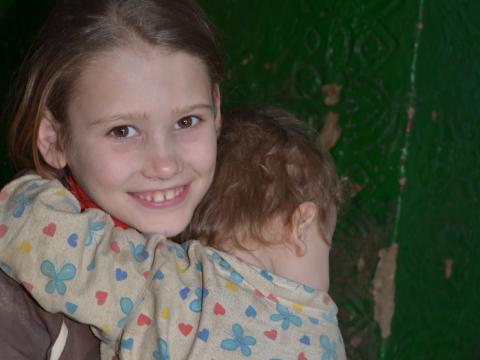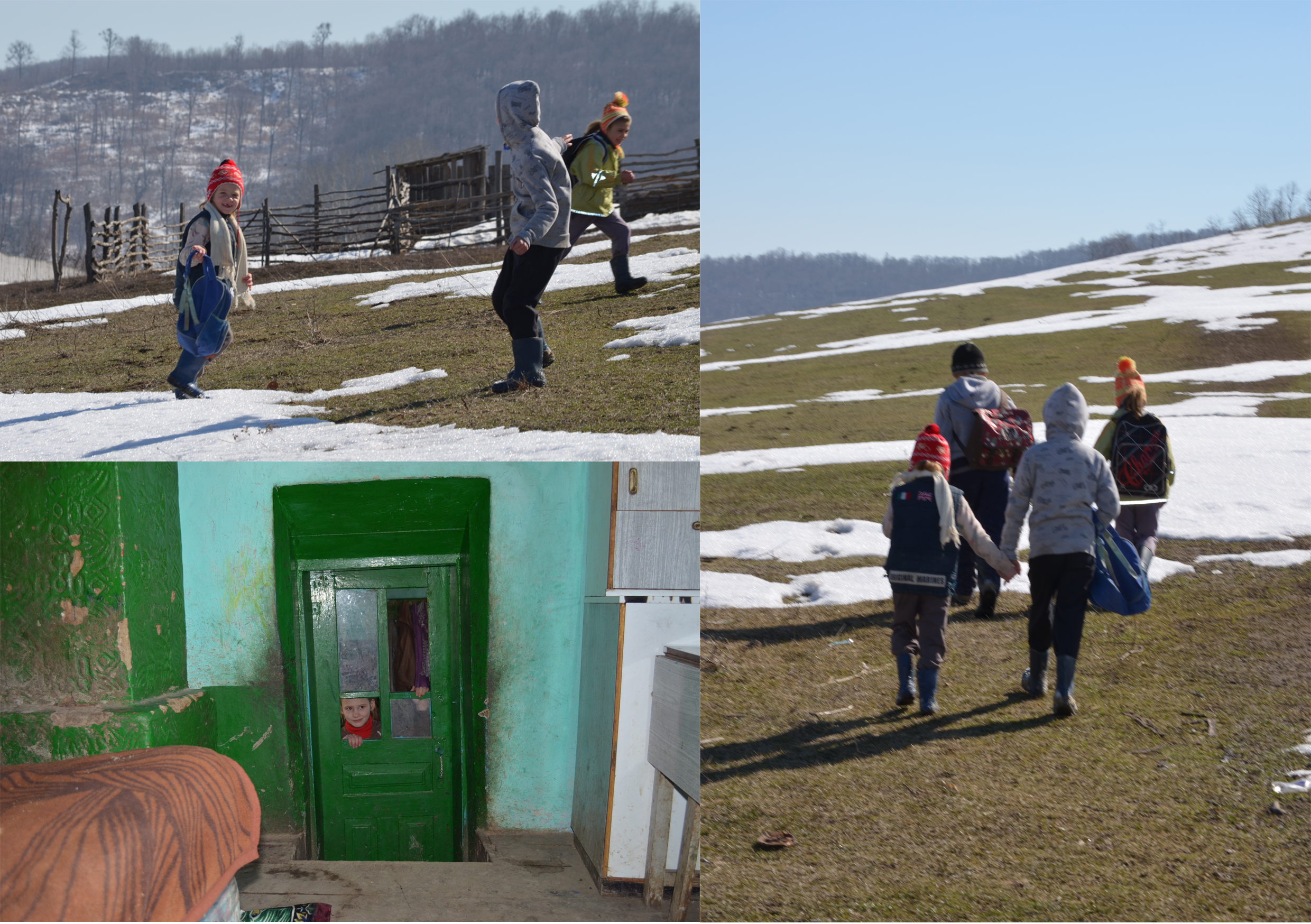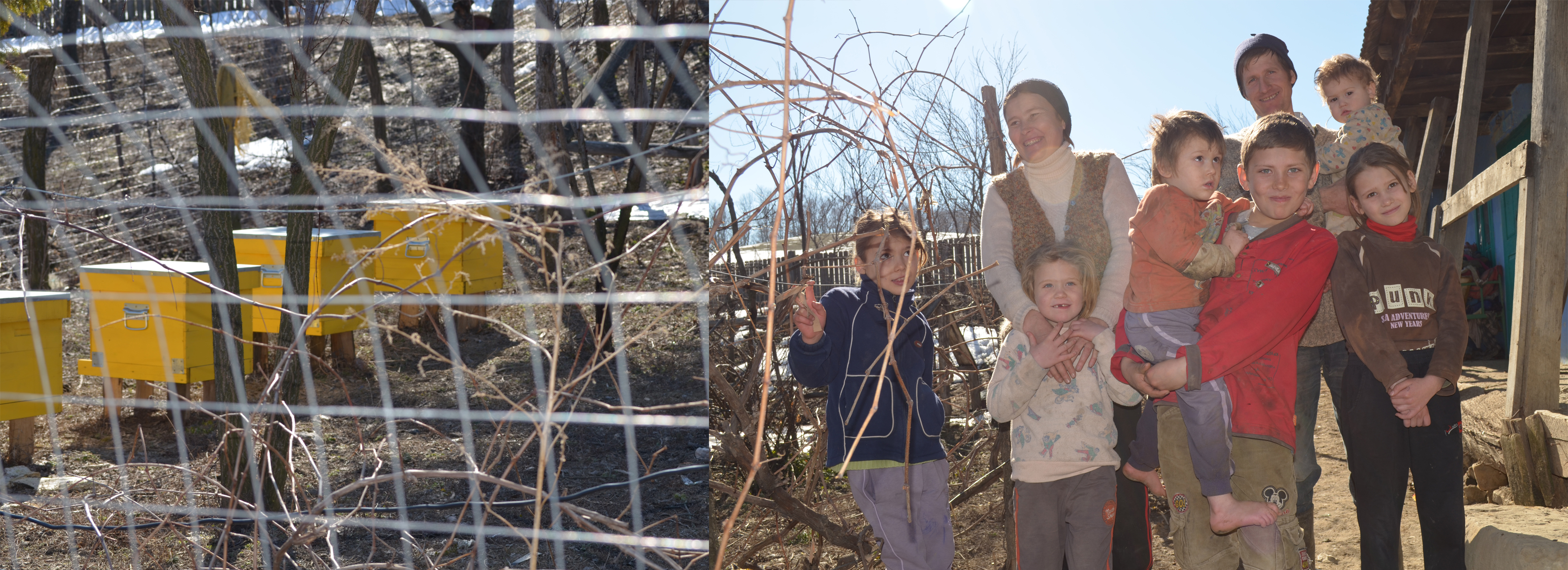The Harsh Journey of Life: Children without Proper Clothes Walk Kilometers to School

“In the middle of nowhere,” well outside the village limits and beyond the end of the road stands an isolated house. This is where Petronela and Marinel, both 35, live with their six children–three boys and three girls under 12, and another one on the way. Neither parent has a job and because neither of them finished high school, it is hard to find one.
This family struggles to survive on 620 lei ($180) a month. Their income comes exclusively from state stipends: $12.50 for the five children over 2; $59 for the child under two; $8.30 in social aid, and $29.70 for being a family with more than three children.
Their small shack is dark and has a strong smell of languor. Entering the house, however, is when one soon understands the poverty and misery the children have to put up with. The house has three areas, two poorly furnished and dusty rooms and a very small chamber, called “the kitchen”. There is no running water or any household appliances. Only recently, have they been connected to electricity, but the daily expenses make it difficult for them to keep paying for this utility so they use it as little as possible. The sober atmosphere is disrupted, from time to time, by the innocent joy and laughter of the children who return from school.
After finishing classes, the children meet together for the walk home. They make the trek as fun as possible: they laugh, they play, they hold hands and start running through an empty field that sometimes hides muddy surprises or small patches of snow. The sunny weather brings them hope that winter will be over, sooner than usual, and they will no longer feel cold. The children do not have proper clothes to go to school. It has often been reported by local community members that these children have been wearing very thin clothes for winter. Their outfits were mainly composed of training pants, and a pajama tops with a vest or sweater and only a thin spring jacket, if they had a jacket at all.
The children wake up early in the morning to go to school. They want to learn but are well behind their peers because of the number of classes they miss each year, especially in the winter time. Florinel, 11, is in third grade, although he should be in fifth; Mariana, 10, is in first grade, although she should be in third. The only one who hasn’t had to repeat a grade is Ionela, 6, but that is because she is just at the beginning of a long educational journey.
Their poor performance in school is due to the long walk and lack of warm clothes. “Sometimes the snow is too high for them to go to school, says Petronela, their mother. “They barely have food, not to mention clothes. I can’t let them get sick by going to school in such thin clothes. I have to keep them at home even if it means skipping school.”
Gheorghita, nearly 2, and Gabriel, 4, are always at home but they fear every unfamiliar presence around them. They do not go to school, but neither are they enrolled in a kindergarten to help them develop social and communicational skills. The smaller one, Gheorghita, finds shelter in the arms of his oldest sister and will go no where else, except for the ones of his mother, when strangers are around.
The children have no words to describe their life. But one does not need words to understand the hardship the family is going through, day after day. They have never stolen, neither have they begged. They learned how to be patient and to imagine that every day is going to be different.
Almost always, the clothes the children are wearing are dirty. They wish that when they return home from school they could change into “house clothes” and leave the good ones for school. However, they do not have any good clothes. They don’t even have any other clothes to change into while the ones they are wearing are washed.
Petronela finds it difficult for her to talk about their financial situation. She feels embarrassed to admit that her children are deprived of clothing, education, social participation, and, most importantly of all, food. “How could it have amounted to such a harsh existence? All of my brothers and sisters live in Iasi and have good jobs,” she says. “They sometimes help me with money for the children. But they have their own problems. I can’t bother them all the time...”
The need for clothes is expensive and ongoing. Children grow fast and often outgrow their clothes in less than a year. Even if they pass their clothing items from one another, the constant wearing makes it difficult to preserve them properly. A pair of the cheapest “training trousers” for children costs $12 - $16, more than the monthy amount they receive per child; a blouse costs $10 - $14. That doesn’t even include the cost of jackets, shoes and stocking caps. To cloth even one child would cost $65 every year, which is out of the question for them right now.
Even though their situation is difficult, Marinel and Petronela respect the gift of life and do not fear that they have too many children. “My mother had 11 children, and we all turned out just fine. We were a poor family but still managed to grow strong and healthy...” says Marinel, their father, recalling his childhood.
No one has showed them how to fight against their situation, how to survive in this cruel world out of which they have paradoxically been isolated from, except for World Vision. The local staff of World Vision has visited them repeatedly and understood their situation. In July 2012, World Vision gave them five nests of bees through the Livelihood for Transformation non-sponsorship project financed by World Vision USA. Both parents have participated in entrepreneurial classes and have actively engaged in nurturing the nests, in order to produce honey that will provide them good and nutritious food for their children as well as financial support. The World Vision staff have been constantly monitoring the family and observed that they took their new “beekeeping job” very seriously. By this spring, they are expected to have enough honey for themselves as well as for selling. In a broader perspective, World Vision has already been discussing with all members of the community and the nearby villages to identify the needs and possible solutions to this family and other’s current problems, in order to properly design and implement a long-term community development programme.
According to a study on poverty and social exclusion released in December, 2012 by the European Statistics Office Eurostat, half of the children in Romania are affected by poverty and social exclusion; the most vulnerable are the children whose parents have a low educational level. On a European level, the highest differences among children are registered in Romania, where 78% of them have parents with a low education level.


